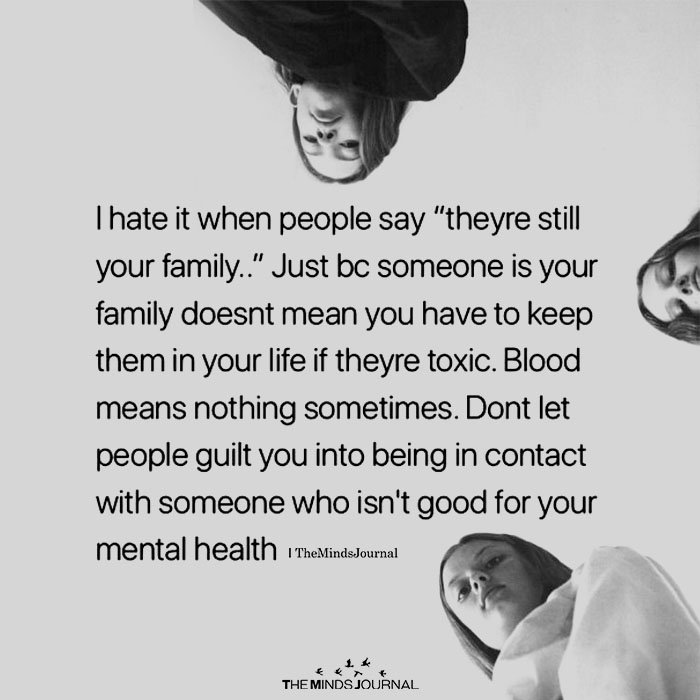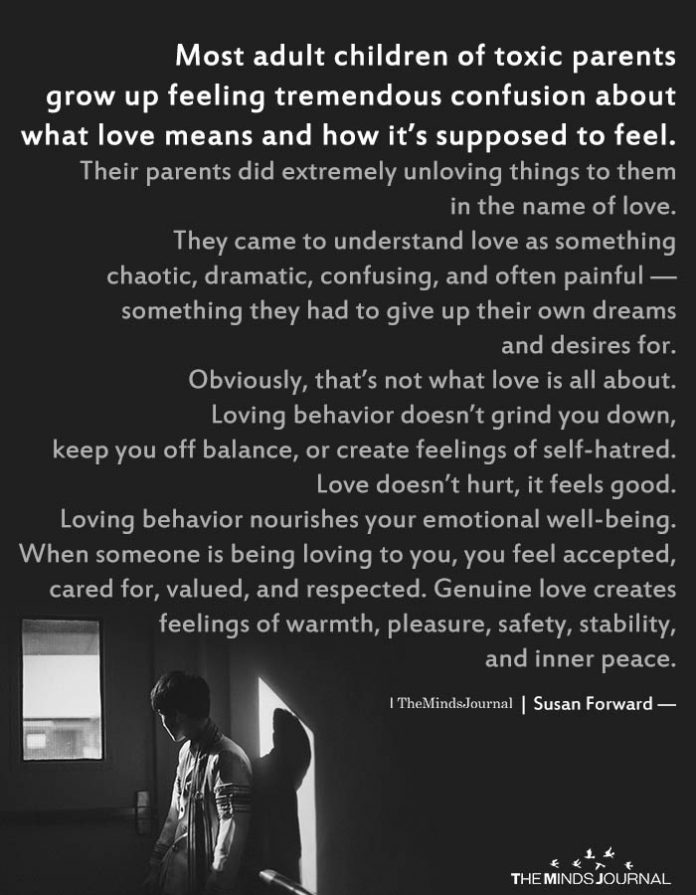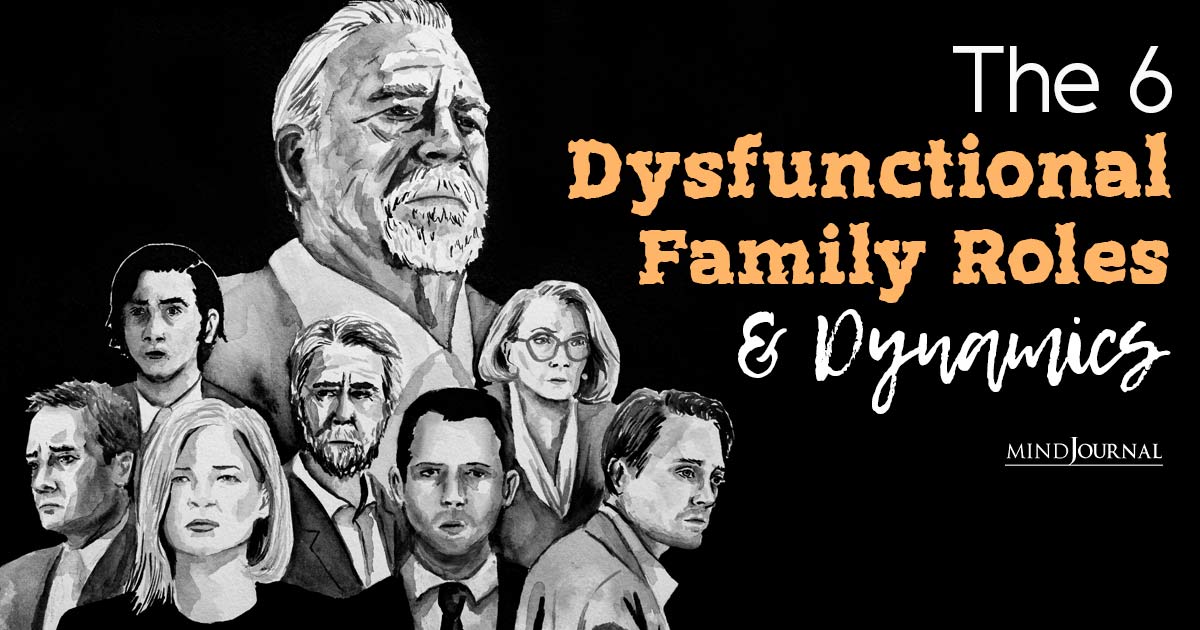When you belong to a dysfunctional family, home doesn’t really feel like a safe space, does it? Add to that dysfunctional family roles, and things could not be more miserable. This article is going to dive deep into the 6 dysfunctional family roles, and unhealthy dynamics in the family.
Regardless of if your family is biological or chosen, you have a role in your family. Your role may be healthy, unhealthy, or perhaps a combination of both. There are many factors that contribute to which role(s) you adopt and which one(s) you do not.
It’s important to assess and change any dysfunctional roles in order to support your emotional health and improve your family relationships.
Ask yourself, do I embody any of these dysfunctional roles in my family? If so, are you ready to change them?
Related: Dysfunctional Family Roles: The 5 Child Roles In Dysfunctional Families
6 Dysfunctional Family Roles
1. The Enabler
Aliases: “The Martyr,” “The Caregiver,” “The Strong One”
On the outside, the enabler appears as a strong and positive member of the family. This role can be adopted by any member of the family – adult or child. The enabler can serve as a caregiver, a protector, and a rescuer. They manage intense responsibilities and obligations that are often too much for one person.
They are unable to establish and maintain boundaries with family members and, as a result, they are always on call to the needs of their family. Enablers can become angry, resentful, anxious, or depressed due to the amount of responsibility that they manage.
Family members might feel that they are being helped by the enabler. Yet, they are actually being denied opportunities and experiences necessary for their growth. Enablers make it difficult for family members to make their own contributions to the family system or to feel as if they need to contribute.
If you know someone who is going to do something that you don’t want to do, why would you do it? Since enablers shoulder all or most familial responsibilities and thus tend to make other members of their family dependent upon them, they can hinder their family members’ ability to learn interdependence and necessary life skills.
If you are an enabler, try these methods in order to practice a healthier role:
- Allow your family members to contribute to the family system and/or caretaking duties by stepping back. You can say “no,” limit your participation, or delegate responsibilities to other family members.
- Meet your needs first before providing support to family members. Take steps to make your self-care a priority.
- Establish fair compromises with family members. If you do X, then I’ll do Y. But, if you refuse to do X, I will not complete Y.
2. The Jester
Aliases: “The Comedian,” “The Cute One,” “The Class Clown”
Families love jesters. They’re the ones who can ease tensions in the family with humour, hyperactivity, and/or cuteness. They can make family gatherings entertaining and can be the life of the party. They can also be encouraging and supportive motivators and cheerleaders for their family members.
In order to ease tensions in the family, jesters are rarely emotionally honest with family members. They struggle to identify and express their genuine feelings, as they fear that doing so may cause or contribute to conflict within their family.
When they experience negative emotions such as sadness, anger, or anxiety, they tend to cover it up with a smile or a joke.
As a result, jesters deny their family members opportunities to experience and resolve conflicts that require genuine emotional expression. Families often need to have difficult conversations in order to healthfully address and resolve simmering tensions.
If you are a jester, try these methods to embrace a healthier role:
- Allow tension to occur in your family. Remember that tension is healthy. You don’t need to fix or manage tension in your family. Just let it unfold and allow your family opportunities to express their honest emotions and to engage in difficult conversations.
- Take a break if you feel overwhelmed by tension in the family. You may need to physically leave a situation or seek support outside your family unit.
- If you feel unsafe to express how you are actually feeling to family members then let them know how the family dynamics are impacting you.

3. The Scapegoat
Aliases: “The Problem,” “The Bad One,” “The Crazy One”
The scapegoat is the person in the family who is obviously struggling. They might express unhealthy behaviours, such as participation in illegal activities or acting out in the classroom or in the home.
They might be viewed as unstable or as a “rebel.” The scapegoat is often in the family spotlight because they are regarded as the family member who has additional needs.
The scapegoat, like every other family member, is impacted by unhealthy dynamics in the family. On the outside, it often looks like scapegoats are causing stress in the family, but in fact scapegoats may be acting out or struggling emotionally because of pre-existing family dysfunctions.
Another aspect to consider is that scapegoats might create fixable problems in the family in order to distract from other family problems that are not as easily solved.
For example, if a scapegoat has failing grades in school, they can receive tutoring or additional support. This seems like a fixable problem, and it can deflect attention from other, more serious family problems, such as patterns of abuse or neglect.
If you are a scapegoat, try these methods in order to practice a healthier role:
- Build a support system outside of your family unit. This support system might be better able to provide you with the support that you need.
- Participate in individual therapy in order to identify your needs and how your actions/emotions are impacted by and contributing to your family dynamics. You can also participate in family therapy in order to improve your family’s dynamics
- Establish and maintain firm boundaries with your family members in order to meet your needs and allow your family opportunities to address deeper issues in the family.
Related: Why Family Scapegoats Become Lifelong Victims?
4. The Hero
Aliases: “The Overachiever,” “The Successful One,” “The Good One”
The “hero” uses success, perfectionism, and/or achievement in order to cope with dysfunctional family dynamics. Heroes might earn perfect grades, excel in sports, have successful careers, or become the model parent.
Heroes rarely cause the family stress, as they are often seen as role models that other family members are encouraged to emulate. Yet, the success of the hero can cause a family to avoid addressing their core issues. For example, it is often assumed that if the hero is doing so well, then the system family must be working.
On the outside, the hero can appear highly functional. Yet, inside they often feel shameful, inadequate, and insecure. Heroes rarely feel accomplished and proud of themselves.
Their accomplishments are not driven by healthy motivations or by a genuine passion to thrive, but are rather used in order to cope with their own insecurities and masque underlying toxic family dynamics. The best accomplishments in the world cannot counteract shame or deep-seated sources of low self-esteem.
If you are a hero, try these methods in order to embody a healthier role:
- Get off the pedestal. Family members might place you on a pedestal, and this can negatively impact your relationships with other family members. For example, some might say that you are ”The Good One” and that your sibling is ”The Screw Up.”
- Improve self-worth by addressing your shame. You deserve to experience self-worth regardless of your accomplishments.
- Participate in individual therapy, as this might help you improve self-worth and explore how your family dynamics contribute to your insecurities.

5. The Lost Child
Aliases: “The Quiet One” “The Shy One,” “The Independent”
The “lost child” is the family member who retreats from family dysfunction due to feeling overwhelmed. They can spend a lot of time alone, pursue singular interests, and/or struggle to establish or maintain relationships with others.
The lost child is rarely seen as a stressor in the family (unless they develop a compulsive coping mechanism; see #6, below). For example, a person may struggle to maintain a job because they need to play hours of video games in order to cope with family dysfunction.
A lost child might appear as if they do not care about their family, but they do. They simply cannot tolerate the emotional turmoil that comes with interacting with their family.
They avoid conflict at all costs, as they tend to shut down or check out when things feel difficult. Some lost children might feel that they are a burden to their family, so they stay away in order to avoid causing the family additional stress.
If you are a lost child, try these methods to embody a healthier role:
- Practice engaging with people outside your family unit during times of conflict in order to feel more comfortable with managing conflict in relationships.
- Learn coping mechanisms that you can use when conflicts or stress occurs in the family so that you are able to manage overwhelming emotions and remain engaged.
- Engage with family members in times that are not stressful or tense as a way to strengthen your family relationships. As your relationships improve, try being present with family members in times of stress and conflict in order to address and resolve issues.
Related: 8 Characteristics Shared By Dysfunctional Families
6. The Compulsive
Aliases: “The Alcoholic”, “The Drug User”
The compulsive is a family role that is often discussed in substance use treatment. This is the person who struggles with addiction or compulsive behaviours and is often the focus of the family’s attention. The compulsive can share many traits with the scapegoat, as they are typically identified as the “problem” in the family.
On the outside, it looks like compulsives are causing stress in the family, but in fact they may be acting out or struggling emotionally because of preexisting family dysfunctions.
The main difference between the compulsive and the scapegoat is that the compulsive specifically struggles with a compulsion or an addiction.
This compulsion or addiction may involve illegal drugs, medications, food, gambling, pornography, or other compulsive behaviours. Remember, compulsions and addictions occur in the family unit and impact the entire family.
If you are the compulsive, try these methods in order to embody a healthier role:
- Seek treatment. You may need professional help to manage your addiction before you’re able to change your role in the family. Treatment can take many forms, such as outpatient therapy, inpatient rehabilitation, and community support groups.
- Build a support system outside of your family unit. This support system might be better able to provide you with the emotional support that you need to manage your actions and learn different methods of coping.
- Establish and maintain firm boundaries with your family members in order to meet your needs. These boundaries will not only help you but will create opportunities for your family to address their own issues as opposed to focusing solely on you.
Gregory, A (2018). Dysfunctional Family Roles Part 1: Are You an Enabler or a Jester? Symmetry Counseling blog. Retrieved from https://www.symmetrycounseling.com/family-therapy-chicago/dysfunctional-family-roles-part-1-are-you-an-enabler-or-a-jester/ Gregory, A (2020). Dysfunctional Family Roles Part 2: Are You a Scapegoat or A Hero? Symmetry Counseling blog. Retrieved from https://www.symmetrycounseling.com/family-therapy-chicago/dysfunctional-family-roles-part-2-are-you-a-scapegoat-or-a-hero/ Gregory, A (2020). Dysfunctional Family Roles Part 3: Are You a Lost Child or A Compulsive? Symmetry Counseling blog. Retrieved from https://www.symmetrycounseling.com/family-therapy-chicago/dysfunctional-family-roles-part-3-are-you-a-lost-child-or-a-compulsive/ McClanahan, K. (2019, October 30). 5 Unhealthy Family Roles in an Addict’s Life. Retrieved from https://www.soberrecovery.com/recovery/traditional-roles-in-families-with-substance-abuse/ Schafler, K. The 6 family roles in addiction. [Blog post]. Retrieved from https://www.katherineschafler.com/blog/the-6-family-roles-in-addiction
Receive a free eBook, 25 Trauma and Anxiety Coping Hacks, by signing up for a monthly newsletter HERE.
Amanda Ann Gregory is accepting speaking engagements. She provides trainings, conference break-out sessions, lunch and learns, and keynotes. Contact her at info@amandaanngregory.com.
Written By Amanda Ann Gregory Originally Appeared On Amanda Ann Gregory










Leave a Reply